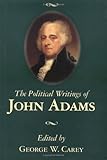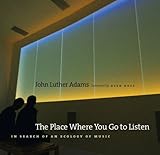|
|
Help |
| Home - Authors - Adams John (Books) | |
e99 Online Shopping Mall
|
|
Help |
| Home - Authors - Adams John (Books) | |
| Back | 21-40 of 99 | Next 20 |
click price to see details click image to enlarge click link to go to the store
| 21. The Political Writings of John Adams by John Adams, George W. Carey | |
 | Hardcover: 650
Pages
(2001-07)
list price: US$35.00 -- used & new: US$44.95 (price subject to change: see help) Asin: 0895262924 Average Customer Review: Canada | United Kingdom | Germany | France | Japan |
|
Editorial Review Product Description Customer Reviews (3)
| |
| 22. The Portable John Adams (Penguin Classics) by John Adams | |
 | Paperback: 576
Pages
(2004-06-29)
list price: US$20.00 -- used & new: US$10.84 (price subject to change: see help) Asin: 0142437786 Average Customer Review: Canada | United Kingdom | Germany | France | Japan |
|
Editorial Review Product Description Customer Reviews (4)
| |
| 23. John Quincy Adams: A Public Life, a Private Life by PaulC. Nagel | |
 | Paperback: 466
Pages
(1999-04-15)
list price: US$25.50 -- used & new: US$18.36 (price subject to change: see help) Asin: 0674479408 Average Customer Review: Canada | United Kingdom | Germany | France | Japan |
|
Editorial Review Product Description Customer Reviews (56)
| |
| 24. John Adams: The American Presidents Series: The 2nd President, 1797-1801 by John Patrick Diggins | |
 | Hardcover: 224
Pages
(2003-06-11)
list price: US$22.00 -- used & new: US$5.98 (price subject to change: see help) Asin: 0805069372 Average Customer Review: Canada | United Kingdom | Germany | France | Japan |
|
Editorial Review Product Description Customer Reviews (12)
| |
| 25. Passionate Sage: The Character and Legacy of John Adams by Joseph J. Ellis | |
 | Paperback: 288
Pages
(2001-02-17)
list price: US$15.95 -- used & new: US$2.89 (price subject to change: see help) Asin: 0393311333 Average Customer Review: Canada | United Kingdom | Germany | France | Japan |
|
Editorial Review Product Description Customer Reviews (36)
| |
| 26. John Adams: Young Revolutionary (Childhood of Famous Americans) by Jan Adkins | |
 | Paperback: 243
Pages
(2002-06-01)
list price: US$6.99 -- used & new: US$3.11 (price subject to change: see help) Asin: 0689851359 Average Customer Review: Canada | United Kingdom | Germany | France | Japan |
|
Editorial Review Product Description Dear Reader: The Childhood of Famous Americans series, seventy years old in 2002, chronicles the early years of famous American men and women in an accessible manner. Each book is faithful in spirit to the values and experiences that influenced the person?s development. History is fleshed out with fictionalized details, and conversations have been added to make the stories come alive to today?s reader, but every reasonable effort has been made to make the stories consistent with the events, ethics, and character of their subjects. These books reaffirm the importance of our American heritage. We hope you learn to love the heroes and heroines who helped shape this great country. And by doing so, we hope you also develop a lasting love for the nation that gave them the opportunity to make their dreams come true. It will do the same for you. Happy Reading! The Editors Customer Reviews (2)
| |
| 27. Dangerous Crossing: The Revolutionary Voyage of John and John Quincy Adams by Stephen Krensky | |
 | Hardcover: 32
Pages
(2004-12-29)
list price: US$18.99 -- used & new: US$7.67 (price subject to change: see help) Asin: 0525469664 Canada | United Kingdom | Germany | France | Japan |
|
Editorial Review Product Description Vivid illustrations and a fast-paced narrative bring to life this little-told story of a character-defining event in the lives of two future presidents. | |
| 28. Letters of John Quincy Adams to His Son on the Bible and Its Teaching by John Quincy Adams | |
 | Paperback: 56
Pages
(2009-12-26)
list price: US$12.72 -- used & new: US$11.00 (price subject to change: see help) Asin: 1151562041 Canada | United Kingdom | Germany | France | Japan |
|
Editorial Review Product Description | |
| 29. Sierra Nevada: The John Muir Trail by Ansel Adams | |
 | Hardcover: 128
Pages
(2006-10-25)
list price: US$50.00 -- used & new: US$28.13 (price subject to change: see help) Asin: 082125717X Average Customer Review: Canada | United Kingdom | Germany | France | Japan |
|
Editorial Review Product Description Customer Reviews (4)
| |
| 30. John Adams & the Prophets of Progress by ZoltaÌn Haraszti | |
| Paperback: 362
Pages
(1964)
Asin: B0007EQVD4 Canada | United Kingdom | Germany | France | Japan | |
| 31. The Big Three in Economics: Adam Smith, Karl Marx, And John Maynard Keynes by Mark Skousen | |
 | Hardcover: 243
Pages
(2007-01-30)
list price: US$27.95 -- used & new: US$18.44 (price subject to change: see help) Asin: 0765616947 Average Customer Review: Canada | United Kingdom | Germany | France | Japan |
|
Editorial Review Product Description Customer Reviews (14)
| |
| 32. John Adams and the Spirit of Liberty by C. Bradley Thompson | |
 | Paperback: 360
Pages
(2002-03)
list price: US$17.95 -- used & new: US$17.94 (price subject to change: see help) Asin: 0700611819 Average Customer Review: Canada | United Kingdom | Germany | France | Japan |
|
Editorial Review Product Description In the first major work on Adams's political thought in over thirty years, C. Bradley Thompson takes issue with the notion that Adams's thought is irrelevant to the development of American ideas. Focusing on Adams's major writings, Thompson elucidates and reevaluates his political and constitutional thought by interpreting it within the tradition of political philosophy stretching from Plato to Montesquieu. This major revisionist study shows that the distinction Adams drew between "principles of liberty" and "principles of political architecture" is central to his entire political philosophy. Thompson first chronicles Adams's conceptualization of moral and political liberty during his confrontation with American Loyalists and British imperial officers over the true nature of justice and the British Constitution, illuminating Adams's two most important pre-Revolutionary essays, "A Dissertation on the Canon and Feudal Law" and "The Letters of Novanglus." He then presents Adams's debate with French philosophers over the best form of government and provides an extended analysis of his Defence of the Constitutions of Government and Discourses on Davila to demonstrate his theory of political architecture. From these pages emerges a new John Adams. In reexamining his political thought, Thompson reconstructs the contours and influences of Adams's mental universe, the ideas he challenged, the problems he considered central to constitution-making, and the methods of his reasoning. Skillfully blending history and political science, Thompson's work shows how the spirit of liberty animated Adams's life and reestablishes this forgotten Revolutionary as an independent and important thinker. This book is part of the American Political Thought series. Customer Reviews (8)
| |
| 33. Adams vs. Jefferson: The Tumultuous Election of 1800 (Pivotal Moments in American History) by John Ferling | |
 | Paperback: 288
Pages
(2005-10-20)
list price: US$19.99 -- used & new: US$5.00 (price subject to change: see help) Asin: 019518906X Average Customer Review: Canada | United Kingdom | Germany | France | Japan |
|
Editorial Review Product Description Customer Reviews (42)
| |
| 34. Revolutionary John Adams by Cheryl Harness | |
 | Paperback: 48
Pages
(2006-01-10)
list price: US$7.95 -- used & new: US$4.08 (price subject to change: see help) Asin: 0792254910 Average Customer Review: Canada | United Kingdom | Germany | France | Japan |
|
Editorial Review Product Description Customer Reviews (1)
| |
| 35. Presidency of John Adams (American Presidency Series) by Ralph A. Brown | |
 | Hardcover: 216
Pages
(1975-09-08)
list price: US$39.95 -- used & new: US$39.95 (price subject to change: see help) Asin: 0700601341 Average Customer Review: Canada | United Kingdom | Germany | France | Japan |
|
Editorial Review Product Description In this volume, Ralph Adams Brown presents a new evaluation of John Adams and of his four years in the presidency. The portrait drawn by Adams's enemies disappears and the second president emerges as a world citizen whose insight, judgment, and perseverance held the young nation together in a critical period. Brown focuses closely on the most significant aspect of Adams's presidency, foreign affairs. He examines the country's increasing concern with matters of defense and Adams's successful efforts to evade foreign entanglements. Describing the vicious personal attacks to which Adams was subjected, and the devious and disloyal maneuvers of his cabinet members, Brown traces Adams's difficulties with Timothy Pickering, James McHenry, Oliver Wolcott, Jr., Alexander Hamilton, and others. He documents Adams's steadfastness to his ideals and principles, despite the hostility, exaggerated accusations, and perfidy that surrounded him. This book is part of the American Presidency Series. Customer Reviews (1)
| |
| 36. The Place Where You Go to Listen: In Search of an Ecology of Music by John Luther Adams | |
 | Paperback: 180
Pages
(2009-04-28)
list price: US$24.95 -- used & new: US$15.64 (price subject to change: see help) Asin: 0819569038 Canada | United Kingdom | Germany | France | Japan |
|
Editorial Review Product Description | |
| 37. The Book of Abigail and John: Selected Letters of the Adams Family: 1762-1784 by Abigail Smith Adams, John Adams | |
 | Hardcover: 432
Pages
(2002-10-03)
list price: US$50.00 Isbn: 1555535232 Average Customer Review: Canada | United Kingdom | Germany | France | Japan |
Customer Reviews (3)
| |
| 38. Revolutionary Management: John Adams on Leadership by Alan Axelrod | |
 | Hardcover: 256
Pages
(2008-02-26)
list price: US$24.95 -- used & new: US$0.01 (price subject to change: see help) Asin: 1599214113 Average Customer Review: Canada | United Kingdom | Germany | France | Japan |
Customer Reviews (2)
| |
| 39. A Defense Of The Constitutions Of Government Of The United States Of America, Against The Attack Of M. Turgot by John Adams | |
| Hardcover: 566
Pages
(2010-09-10)
list price: US$47.16 -- used & new: US$43.87 (price subject to change: see help) Asin: 1163575445 Canada | United Kingdom | Germany | France | Japan | |
|
Editorial Review Product Description | |
| 40. The Birth of Modern Politics: Andrew Jackson, John Quincy Adams, and the Election of 1828 (Pivotal Moments in American History) by Lynn Parsons | |
 | Hardcover: 272
Pages
(2009-05-01)
list price: US$24.95 -- used & new: US$11.64 (price subject to change: see help) Asin: 0195312872 Average Customer Review: Canada | United Kingdom | Germany | France | Japan |
|
Editorial Review Product Description Customer Reviews (7)
| |
| Back | 21-40 of 99 | Next 20 |